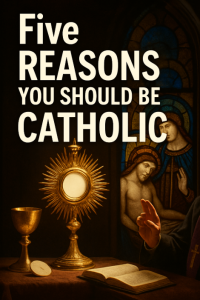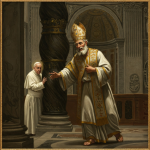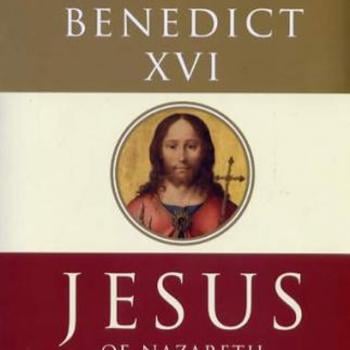
In light of Holy Week, I felt inspired to share five reasons why readers of this article should consider becoming Catholic. Of course, far more than five reasons exist, but for the sake of brevity, I’ve limited myself to five.
On a more personal note, I wish all my readers—old and new—a blessed Holy Week and a joyful Easter. May the risen Christ fill you with His wondrous grace.
Reason 1: Jesus Wants You To
Historically, Jesus of Nazareth established one Church and commissioned His apostles to spread the Gospel. The apostles, in turn, appointed others to continue this mission. This Church still stands today—the Catholic Church. It alone traces its lineage directly to Christ through apostolic succession.
Reason 2: The Catholic Church Rejects Penal Substitution
Unlike most Protestant traditions, the Catholic Church does not teach that the Father punished the Son or poured out His wrath upon Him in our place (a doctrine known as penal substitution). Introduced during the Reformation, this view creates a troubling divide within the Trinity—between Father and Son. In contrast, the Catholic understanding of Christ’s sacrifice emphasizes obedience and love as the path to reconciliation with God (Romans 5:19, Philippians 2:8).
The Catechism of the Catholic Church beautifully explains:
603 Jesus did not experience reprobation as if he himself had sinned. [Cf. Jn 8:46] But in the redeeming love that always united him to the Father, he assumed us in the state of our waywardness of sin, to the point that he could say in our name from the cross: “My God, my God, why have you forsaken me?” [Mk 15:34; Ps 22:2; cf. Jn 8:29] Having thus established him in solidarity with us sinners, God “did not spare his own Son but gave him up for us all”, so that we might be “reconciled to God by the death of his Son”. [Rom 8:32; 5:10]
The Church’s view of the atonement—rooted in restorative love, not divine retribution—offers a profound reason to consider embracing Catholicism.
Reason 3: The Catholic Intellectual Tradition
Let’s face it: Western civilization is deeply shaped by Catholicism. Since its inception, the Church has profoundly influenced art, architecture, medicine, law, science, philosophy, morality, language, literature, and education. Hospitals and universities themselves are fruits of the Catholic tradition.
Even modern classics like The Lord of the Rings reflect this influence. J.R.R. Tolkien, a devout Catholic, wrote in a letter to Fr. Robert Murray:
The Lord of the Rings is of course a fundamentally religious and Catholic work; unconsciously so at first, but consciously in the revision… the religious element is absorbed into the story and the symbolism. (Letter #142 in The Letters of J.R.R. Tolkien, edited by Humphrey Carpenter)
When it comes to intellectual heritage, the Catholic Church stands second to none. Why not explore this tradition from within? Treasures await.
Reason 4: The Sacraments
In one of my first articles for Patheos, I wrote about the connection between the Incarnation and the Church’s seven sacraments. As both physical and spiritual beings, we experience the world through both senses. The sacraments mirror this duality, each with a physical and spiritual component—just as Christ, the Sacrament of God, possesses both human and divine natures.
Here’s a brief summary:
- Eucharist: Bread and wine (physical), Christ’s real presence (spiritual)
- Baptism: Water (physical), cleansing of sin by the Holy Spirit (spiritual)
- Confirmation: Oil and laying on of hands (physical), gift of the Holy Spirit (spiritual)
- Reconciliation: Confession and absolution by a priest (physical), forgiveness by Christ (spiritual)
- Anointing of the Sick: Oil, hands, and prayer (physical), healing and grace (spiritual)
- Holy Orders: Laying on of hands and prayer (physical), ordination to act in persona Christi (spiritual)
- Matrimony: Vows and physical union (physical), grace to reflect Christ’s love for the Church (spiritual)
As a Protestant, my faith lived mostly in my head. I attended Bible studies and worship services, but I lacked the sacraments. While some non-Catholic traditions embrace a degree of sacramentality, none offer the depth and richness of the Catholic sacramental theology. I discovered this beautiful truth only after entering the Church.
Reason 5: A Coherent Moral Framework
The Catholic Church provides a comprehensive and consistent moral framework. It teaches that God created each person in His image, granting everyone inherent dignity—regardless of age or development. Through Natural Law, the Church affirms the existence of moral truths accessible to reason. Through Divine Revelation, it teaches God’s commands (the Ten Commandments) and how we ought to live (the Beatitudes).
Catholic moral teaching also highlights the virtues:
- Cardinal virtues: Prudence, justice, fortitude, and temperance
- Theological virtues: Faith, hope, and love
This framework impacts every facet of life and contributes to the common good. Anyone seeking a consistent and rational moral foundation need look no further than the Catholic Church.
Final Thoughts
Once again, I wish you all a blessed Holy Week and a joyful Easter! To my non-Catholic readers: I hope you’ll reflect on these five reasons with an open heart.
To recap: Five Reasons You Should Be Catholic
- Jesus wants you to.
- The Catholic Church does not teach penal substitution.
- The Catholic intellectual tradition.
- The sacraments.
- A coherent moral framework.
The Spirit and the bride say, “Come!” And let the one who hears say, “Come!” Let the one who is thirsty come; and let the one who wishes take the free gift of the water of life.
— Revelation 22:17
Thank you!
If you liked this article, please leave your comments below. I am very interested in your opinion on this topic.
Read The Latin Right’s other writing here.
Please visit my Facebook page and IM your questions (and follow my page) or topics for articles you would like covered.
Also, please subscribe my YouTube page for updates on upcoming articles.

















